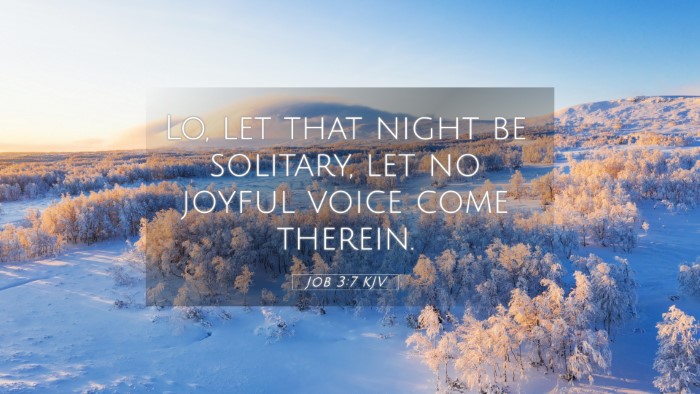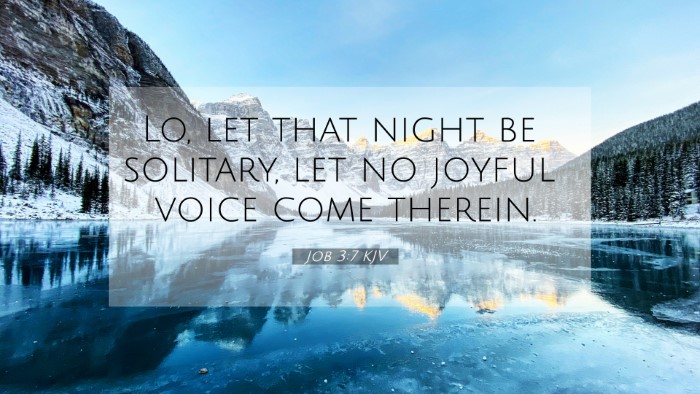Old Testament
Genesis Exodus Leviticus Numbers Deuteronomy Joshua Judges Ruth 1 Samuel 2 Samuel 1 Kings 2 Kings 1 Chronicles 2 Chronicles Ezra Nehemiah Esther Job Psalms Proverbs Ecclesiastes Song of Solomon Isaiah Jeremiah Lamentations Ezekiel Daniel Hosea Joel Amos Obadiah Jonah Micah Nahum Habakkuk Zephaniah Haggai Zechariah MalachiJob 3:7 Similar Verses
Job 3:7 Cross References
Lo, let that night be solitary, let no joyful voice come therein.
Uncover the Rich Themes and Topics of This Bible Verse
Listed below are the Bible themes associated with Job 3:7. We invite you to explore each theme to gain deeper insights into the Scriptures.
Job 3:7 Cross Reference Verses
This section features a detailed cross-reference designed to enrich your understanding of the Scriptures. Below, you will find carefully selected verses that echo the themes and teachings related to Job 3:7 KJV. Click on any image to explore detailed analyses of related Bible verses and uncover deeper theological insights.
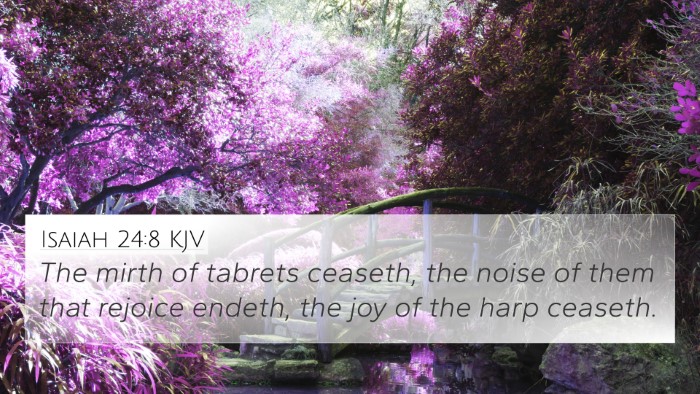
Isaiah 24:8 (KJV) »
The mirth of tabrets ceaseth, the noise of them that rejoice endeth, the joy of the harp ceaseth.
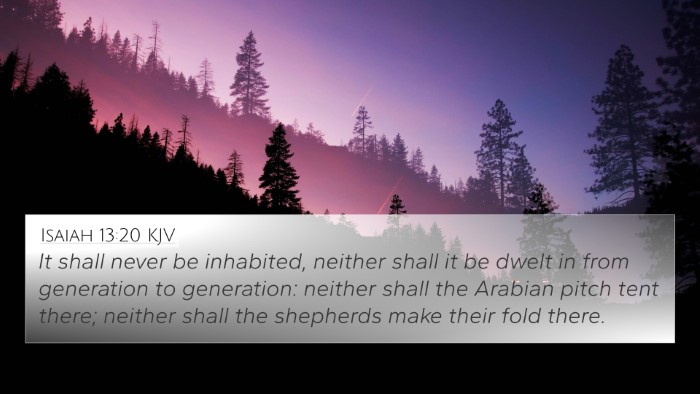
Isaiah 13:20 (KJV) »
It shall never be inhabited, neither shall it be dwelt in from generation to generation: neither shall the Arabian pitch tent there; neither shall the shepherds make their fold there.
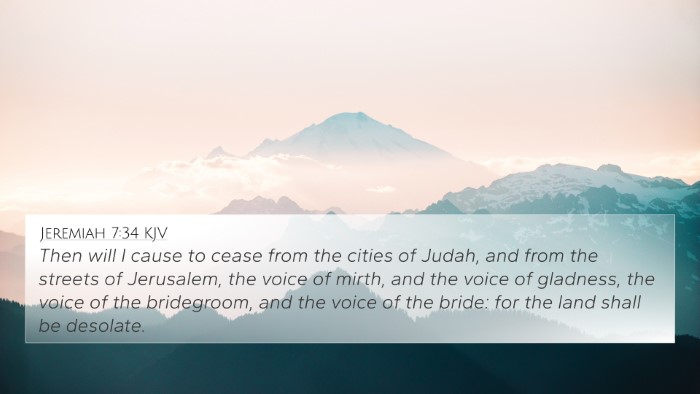
Jeremiah 7:34 (KJV) »
Then will I cause to cease from the cities of Judah, and from the streets of Jerusalem, the voice of mirth, and the voice of gladness, the voice of the bridegroom, and the voice of the bride: for the land shall be desolate.
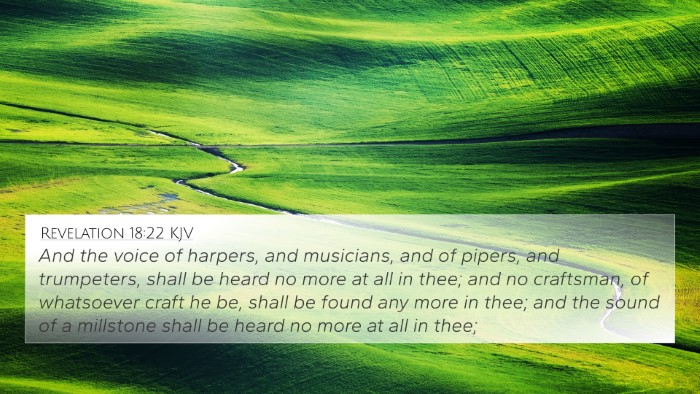
Revelation 18:22 (KJV) »
And the voice of harpers, and musicians, and of pipers, and trumpeters, shall be heard no more at all in thee; and no craftsman, of whatsoever craft he be, shall be found any more in thee; and the sound of a millstone shall be heard no more at all in thee;
Job 3:7 Verse Analysis and Similar Verses
Understanding Job 3:7
Job 3:7 states, "Let that day be darkness; let not God regard it from above, neither let the light shine upon it." This verse embodies Job's deep despair as he curses the day of his birth, reflecting his profound suffering and hopelessness amidst his trials. Below is an amalgamation of insights derived from public domain commentaries by Matthew Henry, Albert Barnes, and Adam Clarke, detailing the implications and interpretations of this verse.
Contextual Overview
Job’s lamentation in chapter 3 marks a pivotal moment in the Book of Job. Following extensive suffering and loss, Job begins to express his agony by questioning the value of life itself, particularly the day he was born.
Meaning and Interpretation
The core insights from the commentaries reveal several layers of meaning:
-
Despair and Darkness:
Job's wish for darkness signifies his desire to avoid the pain of existence, a theme discussed by Matthew Henry. He perceives life as unbearable and filled with suffering, wishing to negate the day that brought him into such anguish.
-
Divine Indifference:
Albert Barnes emphasizes the conviction that Job feels abandoned by God. Job believes that if God does not heed his suffering, then perhaps the day of his birth should remain unremembered.
-
Symbolism of Light and Darkness:
Adam Clarke notes that light symbolizes joy and hope, while darkness represents sorrow and despair. In invoking these symbols, Job articulates a profound emotional turmoil, revealing his struggle between hope and hopelessness.
Thematic Connections
This passage resonates with numerous scriptural themes, illustrating the complexity of human suffering and the quest for divine understanding. The connections to related scripture provide greater insight into Job's lament:
Cross References
- Psalms 88:12: "Shall thy wonders be known in the dark? And thy righteousness in the land of forgetfulness?" – Reflects on the themes of despair and divine silence.
- Ecclesiastes 7:1: "A good name is better than precious ointment; and the day of death than the day of one's birth." – Suggests that under certain circumstances, life can be seen as less valuable.
- Isaiah 45:7: "I form the light, and create darkness: I make peace, and create evil: I the Lord do all these things." – God’s sovereignty over light and darkness demonstrates His control over all aspects of life.
- Jeremiah 20:14: "Cursed be the day wherein I was born: let not the day be blessed wherein my mother bare me." – A parallel lamentation, showcasing the consistent theme of questioning one's existence amid suffering.
- Revelation 21:25: "And the gates of it shall not be shut at all by day: for there shall be no night there." – A contrast between earthly suffering and the promise of a future devoid of darkness and pain.
- Lamentations 3:6: "He hath set me in dark places, as they that be dead of old." – Emphasizes the deep-seated sense of abandonment felt by those in distress.
- Job 10:18-19: "Wherefore then hast thou brought me forth out of the womb? Oh that I had never been born..." – Echoes the same sentiment of wishing for non-existence due to suffering.
Cross-Referencing Insights
Using tools for Bible cross-referencing can enhance understanding of Job 3:7 and its broader implications within scripture. By linking scriptures that share similar themes of despair, uncertainty, and divine silence, one can uncover a more profound theological dialogue concerning human suffering. Understanding these connections is essential in interpreting biblical texts comprehensively.
Tools for Bible Cross-Referencing
- Bible Concordance: Useful for finding related verses through keyword searches.
- Cross-reference Bible Study Guide: Provides systematic approaches to thematic studies across scriptures.
- Bible Reference Resources: Can illuminate various interpretations of specific verses and their interconnections.
Conclusion
Job 3:7 serves as a stark reminder of the depths of human despair and the complexities of existence. By integrating insights from various commentaries and considering its cross-references within scripture, readers are invited to explore the broader themes of pain, abandonment, and the quest for meaning amid suffering. Engaging with the biblical text through cross-referencing creates an enriched understanding and a dialogue that spans both the Old and New Testaments, highlighting the interconnectedness of God's word.

